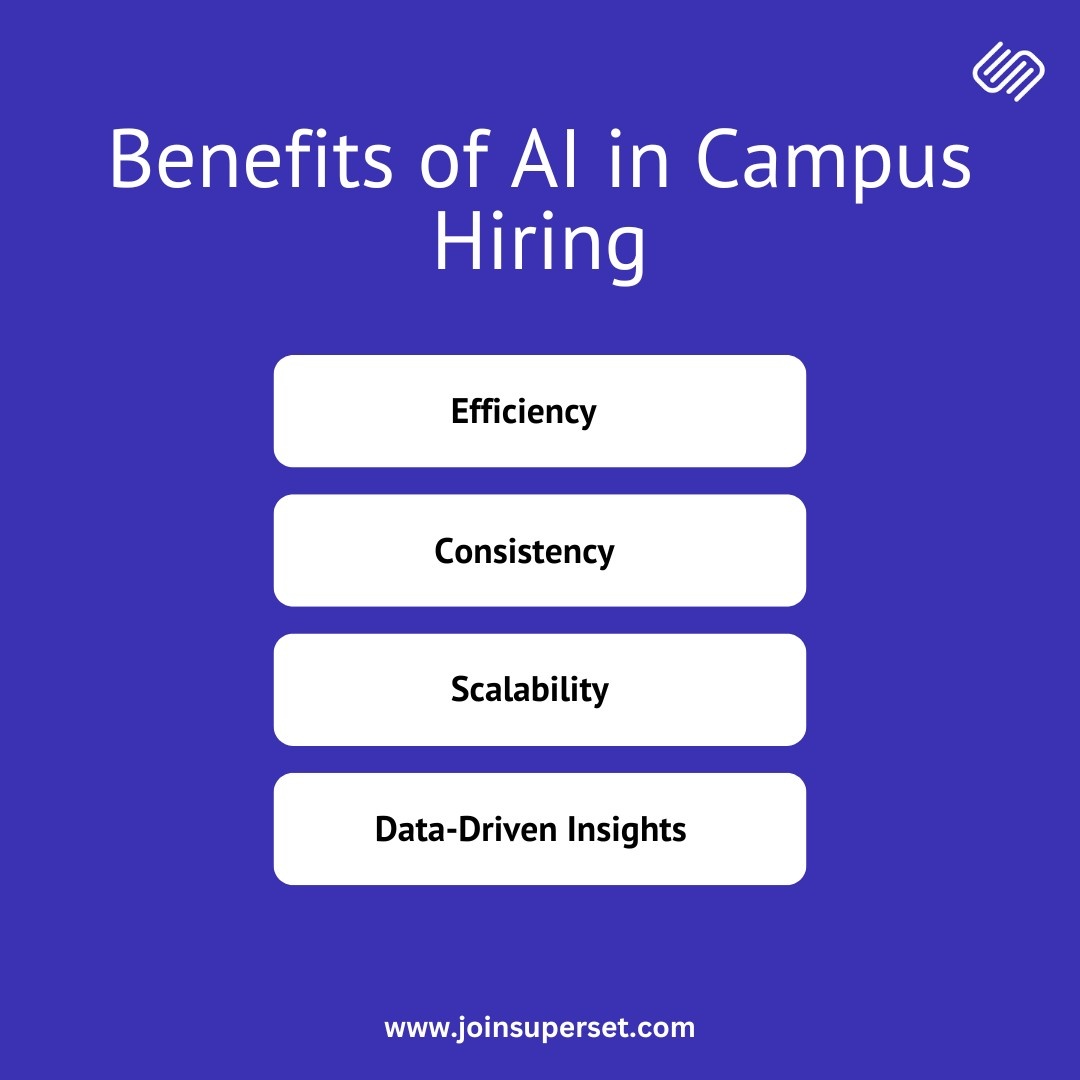Amidst the swiftly evolving technological landscape, universities are increasingly harnessing AI-powered tools to revolutionize their campus hiring processes. Implementing campus hiring automation offers numerous advantages, such as increased efficiency, reduced administrative workload, and enhanced candidate experience. However, the integration of artificial intelligence (AI) in campus hiring also raises ethical concerns that need to be addressed to ensure fairness and equity for all candidates. This blog explores the ethical implications of AI in campus hiring automation, providing universities with insights on how to balance efficiency with fairness.
The Rise of Campus Hiring Automation
Campus hiring automation has revolutionized the traditional recruitment process, transforming how universities and employers connect with potential candidates. By leveraging campus hiring automation software, universities can automate repetitive tasks such as resume screening, interview scheduling, and candidate assessment. This not only saves time and resources but also allows for a more streamlined and consistent hiring process.
The Role of AI in Campus Hiring
AI technologies, such as machine learning and natural language processing, play a pivotal role in enhancing campus hiring automation. These technologies enable the automation software to analyze large volumes of data, identify patterns, and make data-driven decisions. For instance, AI-powered tools can evaluate resumes based on predefined criteria, reducing human bias and ensuring a more objective assessment of candidates’ qualifications.
Benefits of AI in Campus Hiring

- Efficiency: AI-driven automation accelerates the hiring process by swiftly screening and shortlisting candidates, allowing recruiters to focus on more strategic tasks. For example, a university can process thousands of applications in a fraction of the time it would take human recruiters, to ensure timely responses to candidates.
- Consistency: Automated systems apply the same evaluation criteria to all candidates, ensuring a uniform and fair assessment. This consistency eliminates the variability that can arise from human judgment, providing a more standardized and objective evaluation process.
- Scalability: AI can handle large volumes of applications, making it easier to manage high numbers of candidates during peak hiring seasons. Universities can efficiently manage recruitment drives even with limited staff, ensuring that no candidate is overlooked due to sheer volume.
- Data-Driven Insights: AI provides valuable insights and analytics that can help universities and employers make informed decisions. By analyzing trends and patterns in candidate data, universities can identify the most effective recruitment strategies and continuously improve their processes.
Ethical Concerns in AI-Driven Campus Hiring
Despite the numerous benefits, the use of AI in campus hiring automation raises several ethical concerns that universities must address to ensure fairness and equity.
Bias and Discrimination
One of the primary ethical concerns is the potential for AI systems to perpetuate existing biases and discrimination. AI algorithms are trained on historical data, which may contain biases related to gender, race, socioeconomic status, and more. If these biases are not identified and mitigated, the AI system may inadvertently favour certain groups over others, leading to unfair hiring practices.
Mitigating Bias in AI Systems
To mitigate bias, universities should:
- Diverse Training Data: Ensure that the AI algorithms are trained on diverse and representative datasets that reflect a wide range of backgrounds and experiences.
- Regular Audits: Conduct regular audits of AI systems to identify and rectify any biases that may emerge.
- Human Oversight: Incorporate human oversight to review AI-driven decisions and intervene when necessary to ensure fairness.
Transparency and Accountability
Another ethical concern is the lack of transparency and accountability in AI-driven hiring processes. Candidates may not understand how their applications are being evaluated, leading to a lack of trust in the system.
Enhancing Transparency
To enhance transparency, universities should:
- Clear Communication: Communicate to candidates how AI is being used in the hiring process and what criteria are being used to evaluate applications.
- Explainable AI: Use explainable AI models that provide understandable justifications for their decisions, allowing candidates to understand why they were selected or rejected.
- Accountability Mechanisms: Establish mechanisms to hold AI systems and their developers accountable for any unfair or biased outcomes.
Balancing Efficiency and Fairness
To balance efficiency with fairness, universities need to adopt a holistic approach that integrates ethical considerations into every stage of the campus hiring automation process.
Ethical AI Design and Development
Universities should prioritize ethical AI design and development by:
- Ethical Frameworks: Developing ethical frameworks and guidelines that outline the principles and standards for AI use in campus hiring. These frameworks should address issues such as bias, transparency, accountability, and data privacy.
- Interdisciplinary Collaboration: Collaborating with ethicists, data scientists, and legal experts to ensure that AI systems are designed and implemented ethically. This interdisciplinary approach ensures that ethical considerations are integrated into the technical development process.
- Continuous Improvement: Continuously improving AI systems based on feedback, audits, and advancements in technology to address emerging ethical concerns. Regular audits and assessments help identify and rectify biases and ensure that the AI system aligns with ethical standards.
Fair Candidate Assessment
Ensuring fair candidate assessment requires a multi-faceted approach:
- Holistic Evaluation: Incorporate multiple evaluation methods, such as interviews, assessments, and references, to complement AI-driven evaluations. This holistic approach provides a more comprehensive view of candidates’ qualifications and potential.
- Bias Training: Provide bias training for recruiters and hiring managers to raise awareness of potential biases and how to mitigate them. Training programs should focus on recognizing and addressing unconscious biases that may influence hiring decisions.
- Feedback Mechanisms: Establish feedback mechanisms that allow candidates to raise concerns and provide input on the hiring process. Open channels of communication help identify areas for improvement and ensure that candidates feel heard and valued.
The Role of Virtual Placement Drives and Virtual Hiring
The COVID-19 pandemic has accelerated the adoption of virtual placement drives and virtual hiring processes, further emphasizing the need for ethical AI practices. Virtual placement drives enable universities to connect with employers and candidates remotely, providing a flexible and accessible platform for recruitment.
Advantages of Virtual Placement Drives
- Accessibility: Virtual placement drives provide greater accessibility for candidates from diverse geographical locations, reducing barriers to entry. Candidates can participate in recruitment processes without the need for travel, making it easier for those from remote or underserved areas.
- Cost-Effective: Virtual hiring processes are often more cost-effective, eliminating the need for physical venues and travel expenses. Universities can allocate resources more efficiently, focusing on improving the candidate experience.
- Flexibility: Candidates can participate in virtual interviews and assessments at their convenience, enhancing their experience. This flexibility accommodates different time zones and personal schedules, making the recruitment process more candidate-friendly.
Ensuring Ethical Virtual Hiring Practices
To ensure ethical virtual hiring practices, universities should:
- Inclusive Technology: Use inclusive technology that accommodates candidates with disabilities and diverse technological access. Accessibility features and alternative communication methods should be integrated into virtual hiring platforms.
- Data Privacy: Prioritize data privacy and security to protect candidates’ personal information during virtual hiring processes. Robust data protection measures and transparent data handling practices build trust with candidates.
- Ethical AI Integration: Apply the same ethical considerations for AI use in virtual hiring as in traditional hiring processes. Ethical guidelines should be consistently applied across all recruitment platforms and technologies.
Conclusion
As universities continue to embrace campus hiring automation and campus hiring automation software, it is crucial to address the ethical implications of AI in these processes. By prioritizing fairness, transparency, and accountability, universities can create a more equitable and efficient virtual hiring process that benefits both candidates and employers. Balancing efficiency with fairness requires a commitment to ethical AI practices, continuous improvement, and a holistic approach to candidate assessment. In doing so, universities can harness the power of AI to enhance their campus hiring processes while upholding the values of equity and justice.








